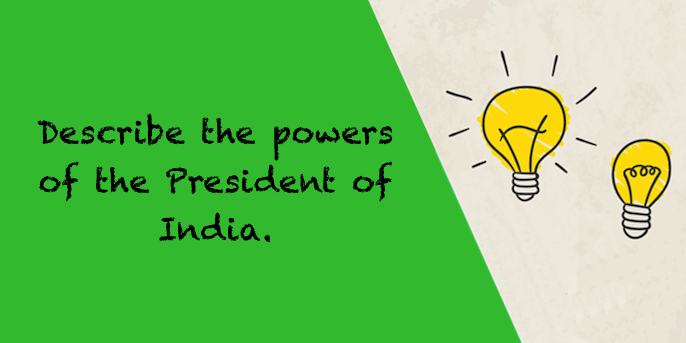Table of Contents
Powers and functions of President of India
The President of India
in Indian constitution established the parliamentary form of Government as distinguished from American type of government. The prime minister is head of the council of Ministers. The council of Ministers is responsible to the House of people.Though the executive power is vested in the president but he exercises this power with the aid and advice of the council of ministers.
The President of India is not directly elected by the people. Art 54 provides that the president shall be elected by an electoral college consisting of :
a)The elected members of both houses of parliament ;and
b) the elected members of the legislative assemblies of states.
The President shall hold the office for a term of five years from the date on which enters upon his office.
Executive powers of president
The president is the head of Indian republic. The Constitution of India has conferred extensive executive powers on the president. All executive powers and functions of the union executed in the name of the President.
president has power to appoint the Prime Minister and on his advice or other ministers of the union, the judges of the supreme court, the high court’s, the governors of the states, the Attorney General,the comptroller and auditor general, the Chairman and members of public service commission, the members of finance commission and official commissions, special officer for Schedule Caste and tribes.
He also had the power to remove the officers. This power has been produced subject to the constitution and with advice of the council of Ministers.
Military powers
The President of India is supreme commander of the defence forces of the country. He has power to declare war and peace.
Diplomatic Powers
The president sends and receives ambassadors and other diplomatic representatives. All treaties and international agreements are negotiated and included in the name of president those subject to ratification by parliament.
Legislative powers
President has power to summon and prorogue the parliament and he can dissolve the Loksabha. The president is bound to summon Parliament within six months from the last sitting of the former session.
Every bill passed by both houses of parliament is to be sent to the president for his assent. He may give assent to the bill or withhold his assent and in the case of a bill other than money bill, May return it to the house for consideration. If the bill is again passed by both the houses of the parliament with or without amendment, he must give his assent to it when it is sent to him for the second time. President nominates 12 members of rajya sabha from among persons having special knowledge of practical experience of literature science art and social service. He is authorised by the constitution to nominate two Anglo Indians to Lok sabha if he is of opinion that the Anglo Indian community is not adequately represented in the house.
Ordinance making power of the president – Art 123
The most important legislative power of the president is his ordinance making power. when both houses of the parliament are not in the session and President is satisfied that circumstances exist which render it necessary for him to take immediate action
He can make an ordinance.
Pardoning power
Under article 72 the president has the power to grant pardons, remit or commute the sentence of any person convicted of any offence convicted of any offence.
M.Ram vs Union of India
The power to pardon is exercised by the president on the advice of the council of ministers.
Emergency Powers of the President
In the case of emergency arises out of failure of constitutional machinery in the state the president may assume any of the powers vested in the governor. The power of the state legislation shall be exercised by or under the authority of the president.
Position of the President
Shamsher Singh vs State of Punjab
In the above case supreme court held that the president and governors are only constitutional and formal heads
They exercise their powers and functions under constitution only.
Ram Jawata Kapur vs State of Punjab
In the above case it was observed by the court that under Article 53 (1) of the constitution of India the executive powers of the union is vested in the president but under Article 74 there is to become sale of minister with the Prime Minister for advising the President.
Author: Pooja Pawar,
NBT Law College Nashik

